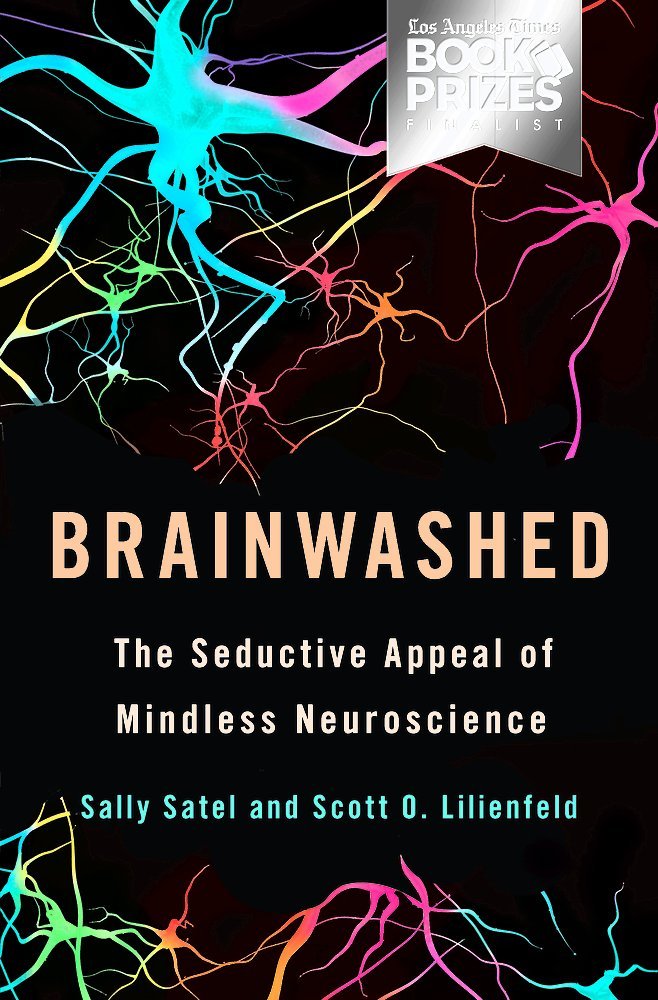Found in 4 comments on Hacker News
JackFr · 2013-08-10
· Original
thread
Can we please stop with "emerging neuroscience" crap. http://www.amazon.com/Brainwashed-Seductive-Appeal-Mindless-...
maebert · 2013-08-06
· Original
thread
Oh, I have absolutely no doubts about that! And from at least the review article they had on this page [1], it seems like the do some solid psychological assessment of gratitude. What does concern me though is when neuroscience is thrown into the mix just because everything seems more convincing with brain scans[3]. The articles cited referred to in the blog posts linked in the original blog post however often follow this pattern: (1) Assess X (say, gratitude) with an established or new questionnaire. (2) find a condition to vary (3) do a fMRI in both conditions and (4) correlate the contrast with the questionnaire. If you found a correlation, you found the neuronal cause for X! Publish!
This is just a huge waste of money. And also often enough poorly done [2].
[1] http://books.google.com/books?hl=en&lr=&id=JYj4KStQjhIC&oi=f... [2] http://www.edvul.com/pdf/VulHarrisWinkielmanPashler-PPS-2009... [3] http://www.amazon.com/gp/product/0465018777/ref=as_li_ss_tl?...
tokenadult · 2013-06-26
· Original
thread
Comments here decry pop neuroscience. I will recommend here a new book, Brainwashed: The Seductive Appeal of Mindless Neuroscience by Sally Satel and Scott O. Lilienfeld, who are both thoughtful and appropriately skeptical researchers on neuroscience topics.
http://www.amazon.com/Brainwashed-Seductive-Appeal-Mindless-...


1) Most people who have read about genetic influences on human behavior have not read the masters, but rather their disciples. The masters of behavior genetics research take care to write about the concept of "reaction range," the variety of possible behavior patterns that MIGHT arise from an individual with a given genotype under differing environmental influences. It is apparent that the reaction range for many human behaviors is very broad even if genotype is fixed.[1]
2) Simply adding some brain-scan data to some hypothesis pulled out of a hat will make even the most wild and crazy hypothesis more plausible to lay readers. Neuroscience is hard, and so far there are not a lot of neuroscience conclusions about human behavior that are well replicated and well backed up by theory.[2]
[1] The review article Johnson, W. (2010). Understanding the Genetics of Intelligence: Can Height Help? Can Corn Oil?. Current Directions in Psychological Science, 19(3), 177-182
http://apsychoserver.psych.arizona.edu/JJBAReprints/PSYC621/...
looks at some famous genetic experiments to show how little is explained by gene frequencies even in thoroughly studied populations defined by artificial selection.
"Together, however, the developmental natures of GCA [general cognitive ability] and height, the likely influences of gene-environment correlations and interactions on their developmental processes, and the potential for genetic background and environmental circumstances to release previously unexpressed genetic variation suggest that very different combinations of genes may produce identical IQs or heights or levels of any other psychological trait. And the same genes may produce very different IQs and heights against different genetic backgrounds and in different environmental circumstances. This would be especially the case if height and GCA and other psychological traits are only single facets of multifaceted traits actually under more systematic genetic regulation, such as overall body size and balance between processing capacity and stimulus reactivity. Genetic influences on individual differences in psychological characteristics are real and important but are unlikely to be straightforward and deterministic. We will understand them best through investigation of their manifestation in biological and social developmental processes."
[2] The book Brainwashed: The Seductive Appeal of Mindless Neuroscience by Sally Satel and Scott O. Lilienfeld
http://www.amazon.com/Brainwashed-Seductive-Appeal-Mindless-...
explains the gaps in current knowledge about neuroscience of human behavior and why a few brain scans in a few subjects don't tell us much about brain function before other study methods are applied to the problem.